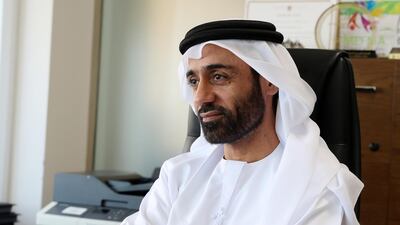Dubai is expected to roll out an efficiency programme targeting industry by 2021, according to Etihad Esco, the Dubai-based energy efficiency company.
Known as the Super Esco for its role as an accreditor and regulator of firms engaged in the sector, Etihad Esco has been mulling industry-specific targets for the emirate, starting with its logistics sector.
"What we see from experience, the most important thing for industrial facilities is solar because of large areas of roof that we have over these facilities so solar will be the most easy, quick win thing to do," Ali Al Jassim, chief executive at Etihad Esco told The National in an interview in Dubai.
"Our plan was after 2021, some they come much earlier. We’re talking to some of them and some [have] also asked for feasibility study from us," he added.
Energy efficiency programmes have gained currency in the Middle East, with the UAE and now Saudi Arabia looking to generate higher energy savings. Etihad Esco had set targets of 20 per cent energy savings by 2021 and 30 per cent by 2030. Initial targets had already been exceeded with plans underway to revise targets. Etihad Esco is eyeing Dh500 million worth of energy savings by 2030 from multi-million dollar projects, primarily from retrofitting and solar rooftop deployment.
Dubai has achieved saved about Dh1.2 billion over the past decade due to its efforts to conserve electricity and water, and plans to reduce carbon emissions by 16 per cent by 2021 as well as energy and water use by 30 per cent by 2030, according to Dubai Electricity and Water Authority.
The Super Esco will consider different targets for industry based on consumption baselines, with large Dubai conglomerates such as the Jebel Ali Free Zone, Dry Docks, DP World and industrial and government-backed entities the first to come under the purview of the efficiency programme.
"In smaller facilities, the savings will have less than one per cent [impact] so we don't focus there. We look at the larger stakes, like groups of industries, these are our targets,” said Mr Jassim.
Mr Al Jassim also sees similar appetite for industrial efficiency programmes in Abu Dhabi, particularly in the energy sector, but noted the emirate has yet to develop targets to generate energy and water savings.
Across the board, the company currently has projects worth $250m under execution with schemes worth between $150m and $200m planned for 2019.
Etihad Esco is also looking at opportunities in Saudi Arabia, where it recently signed an agreement with holding company Vision Invest to establish a joint entity to provide energy efficiency solutions in the kingdom.
Saudi Arabia, the world’s largest crude-exporting nation, established its own Super Esco in 2017 with the backing of the kingdom's sovereign Public Investment Fund and a capitalisation of 1.9 billion riyals (Dh1.86bn).
Etihad Esco is currently executing two in the kingdom with one scheme in the hotel industry in the finance stage with the feasibility study already prepared.
"We’re hoping that we complete the signing and start the project before the end of the year,” said Mr Al Jassim.
"The savings will be between 400,000 to 500,000 [Saudi riyals] for that specific facility and the investment will be something close to three million, so in three years they get their money back,” he said.
In the UAE, Etihad Esco is currently executing 18 projects, which are set for completion in 2020, including lighting retrofit for terminals one, two, three as well as concourse B at Dubai Airport.
"We’re talking about 25 to 35 per cent. I think it’s something close to $30m for Dubai Airports on an annual basis, so within four to five years they pay back the investment and finance,” said Mr Al Jassim.


